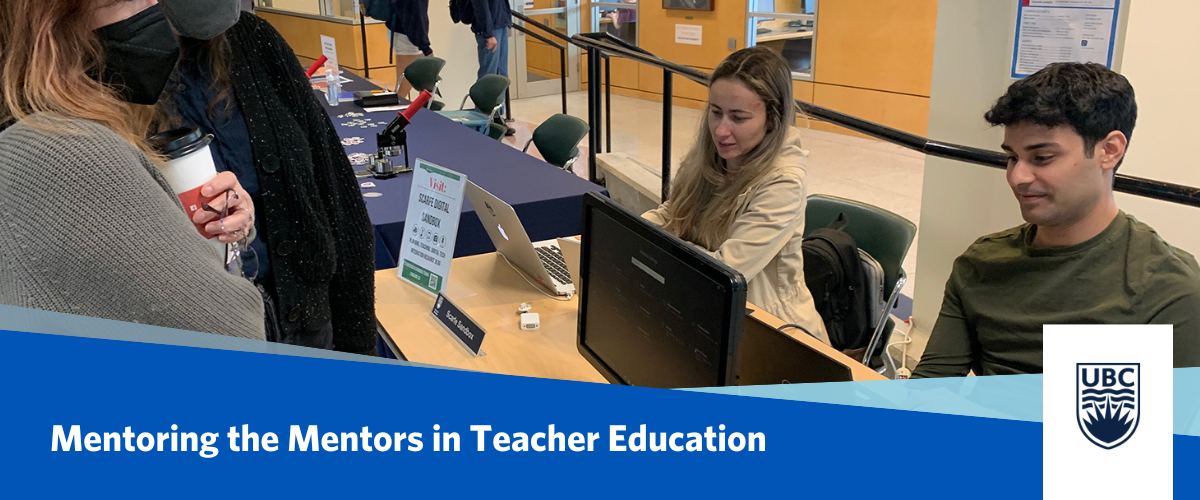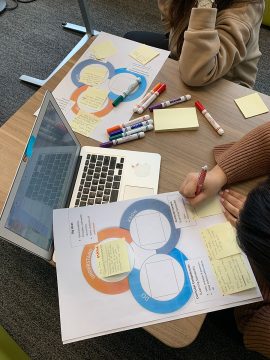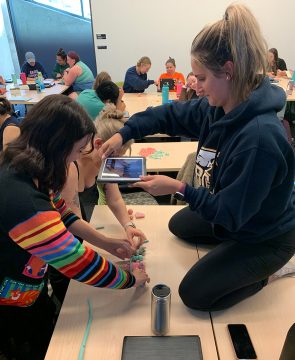
Helping our students find success in the Bachelor of Education (BEd) program is a community effort in the Faculty of Education. Peer mentors, under the supervision of Learning Design Manager Yvonne Dawydiak, work with teacher candidates in all UBC teacher education program options (in person and remote), to help the students set and meet their goals with planning for practicum in K-12 schools in the Lower Mainland and in rural communities throughout the province.
 The peer mentors, who are hired by the Teacher Education Office through the UBC Work Learn Program, each come into the role with a particular area of expertise. They are all graduate students in education and are often also practicing teachers. This year, we have two virtual mentors who are Master of Educational Technology students: Curtis Lai, a grades 5-7 teacher in Vancouver, and Tamara Jabbour, a digital tech facilitator and French language teacher based in Edmonton. In-person workshops and consults are provided by Ariane faria dos Santos, an international student who is working towards a PhD with the Department of Curriculum and Pedagogy. Daniel Bagnall recently completed a term working as a peer mentor with the TEO and earned a Master in Counselling Psychology; he is now working as a school counsellor in Vancouver.
The peer mentors, who are hired by the Teacher Education Office through the UBC Work Learn Program, each come into the role with a particular area of expertise. They are all graduate students in education and are often also practicing teachers. This year, we have two virtual mentors who are Master of Educational Technology students: Curtis Lai, a grades 5-7 teacher in Vancouver, and Tamara Jabbour, a digital tech facilitator and French language teacher based in Edmonton. In-person workshops and consults are provided by Ariane faria dos Santos, an international student who is working towards a PhD with the Department of Curriculum and Pedagogy. Daniel Bagnall recently completed a term working as a peer mentor with the TEO and earned a Master in Counselling Psychology; he is now working as a school counsellor in Vancouver.
Each peer mentor is encouraged to approach this work from their own unique perspectives and to incorporate a non-judgmental, just-in-time coaching stance with Yvonne Dawydiak, who acts as a ‘mentor to the mentors’ throughout their term. Curtis Lai (MET ’23) shares how he incorporates design-thinking in his work with teacher candidates:
Through consultations and workshops, we are able to empathize and learn about each situation, ideate strategies and solutions, and follow our teacher candidate’s progress down the line. It is truly a position of adaptability, flexibility, and creative thinking, and I am grateful for the opportunity to further develop these much-needed skills.
As peer mentors, they not only provide support, but also recognize the impact this work has on their own professional and personal goals.
More often than not, I am learning right alongside the teacher candidates I am supporting due to the exchange of experiences and knowledge. This reflexive and relational nature of the position has made me realize mentorship is a two-way street by which both parties walk away with new understandings.
Curtis Lai, peer mentor
 Planning for webinars, workshops and walk-by foyer sessions, peer mentors showcase a variety of pedagogical approaches, often enhanced by the inclusion of digital tools, to help teacher candidates broaden their perspectives and consider how they might incorporate varied strategies and tools in their teaching. The Scarfe Digital Sandbox, an open education resource repository aimed at pre-service and in-service teachers and Faculty of Education instructors, is kept fresh, overseen by Yvonne Dawydiak. The peer mentors’ assistance ensures there is a wide variety of resources and opportunities available to teacher candidates, and also brings a more inclusive approach with their different viewpoints.
Planning for webinars, workshops and walk-by foyer sessions, peer mentors showcase a variety of pedagogical approaches, often enhanced by the inclusion of digital tools, to help teacher candidates broaden their perspectives and consider how they might incorporate varied strategies and tools in their teaching. The Scarfe Digital Sandbox, an open education resource repository aimed at pre-service and in-service teachers and Faculty of Education instructors, is kept fresh, overseen by Yvonne Dawydiak. The peer mentors’ assistance ensures there is a wide variety of resources and opportunities available to teacher candidates, and also brings a more inclusive approach with their different viewpoints.
When not working directly with students, peer mentors each take on passion projects where they research and add resources and blog posts that may be connected to their own teaching and research interests, and may also be based on conversations they have with teacher candidates. These resources may also become the basis of a workshop or webinar. The goal is to value their time while leveraging their unique perspectives and expertise to create resources that will have lasting value and impact on current and future teacher candidates, teachers and faculty.
Recently, Ariane faria dos Santos developed a resource titled “Unit Planning: one teacher’s approach”, in an effort to share with teacher candidates that there are many ways to approach planning learning experiences for their students.
A big part of being a teacher means learning how to put all pieces of a classroom together and make wise decisions to support each student you are teaching. The challenge and the beauty of this work are that there are no wrong or right ways of doing and the complexity of all pieces together will always generate a unique experience. However, it does not mean that you can not prepare teacher candidates to be aware of the pieces and their possible ways of interaction. In this sense, the peer mentor consults create opportunities for teacher candidates to simulate, in an environment without stress, some of these teacher professional practices and reflect on how these practices may support their students.
Ariane faria dos Santos, peer mentor
In order to support this important work, Learning Design Manager Yvonne Dawydiak writes Work Learn grant proposals bi-annually for the peer mentor positions and ensures that the incoming peer mentors have a holistic orientation to the BEd program, the BC Curriculum, and the Faculty of Education. Yvonne also helps to establish connections for the peer mentors with UBC education librarians and other resources in the faculty. Through the co-planning, co-teaching and resource collaborations that Yvonne is engaged in with BEd faculty and instructors, peer mentors have the opportunity to design resources that can be formally embedded in multi-section courses. These opportunities enrich the peer mentors’ learning and experience as scholars while also enriching the practices of those with whom they work.
Particularly for me as a PhD student that has been outside a K-12 classroom, my work as a peer mentor helps me to keep in contact with the reality of classroom practices and analyze the theories I have studied in a more meaningful way.
Ariane faria dos Santos, peer mentor
If you are interested in learning more about the resources developed by Yvonne and the peer mentors, please visit the Scarfe Digital Sandbox Blog where you’ll find blog posts and resources related to teaching strategies, Applied Design Skills and Technologies, STEAM and other cross-curricular resources. On the Designing Learning Blog , you’ll find resources specific to planning for the BC Curriculum including lesson and unit plan examples along with newly developed French resources (with more on the way!). Please don’t hesitate to reach out to peer mentors via scarfe.sandbox@ubc.ca or directly to the TEO Learning Design Manager.